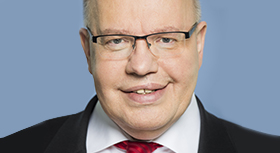You can subscribe to the Energy Transition
Order the international edition of the "Energiewende direkt" Newsletter here.
Coal-mining regions could in future convert their old district heating supply into a climate-friendly, low-carbon supply system. A regulatory sandbox for the energy transition is now testing how this can be achieved across four locations in North Rhine-Westphalia.
Find out moreFor more than ten years, Germany has been maintaining energy partnerships and energy dialogues with countries across the world. These formats give a boost to the global energy transition and mutual learning, and they give rise to solutions tailored to the needs of individual countries.
Find out more
'We must harness the European Green Deal as a growth strategy for our economy that will enable us to access growth markets and safeguard jobs with the help of innovations and new clean technologies.'
Peter Altmaier, Federal Minister for Economic Affairs and Energy, speaking on the occasion of Europe Day in early May
In order to stop the pandemic from slowing down the energy transition, the Bundestag and Bundesrat adopted a Planning Safeguarding Act and several amendments to energy legislation. Said Federal Minister for Economic Affairs and Energy Peter Altmaier on the subject: 'The amendments will ensure that the COVID-19 pandemic does not delay the energy transition. The Planning Safeguarding Act aims to ensure that important planning and approval procedures, for example for the expansion of electricity grids, can also take place rapidly during the COVID-19 pandemic. The legal amendments in the field of renewables are intended to make sure that the current restrictions and delays will not have a negative impact on the market participants.'
In early May 2020, the Bundesnetzagentur confirmed the necessary grid reserves for the next winter semester (2020/2021) and for the year 2024/2025. According to their calculations, the need for generation capacity from the grid reserve will be 6,596 megawatts for winter 2020/2021. This is similar to the preceding years. As part of the regular process, the need for a winter further into the future is also calculated, in this case for 2024/2025. The grid reserve forecast for that winter is 8,042 megawatts. The grid reserve is designed to prevent grid overload in the transmission network, which might result from a lack of new grid capacity. High generation rates from wind-powered installations that coincide with high demand can only be handled if the grid is stabilised. This entails lowering the amount of power fed into the grid before the bottleneck and increasing it behind the bottleneck. This re-despatch mechanism normally draws on power plants that are operating as market players. Once these have run out of capacity, the grid reserve is brought to life. These are power plants that are no longer active players on the power market, but only operate when requested by the network operators when they are needed for re-despatch.
The International Renewable Energy Agency (IRENA) has published its first 'Global Renewables Outlook'. The report highlights the economic potential of the global energy transition. It looks into the energy industry, investment strategies, and the necessary political framework that is required for the global energy transition to be a success. One of the key issues covered in the report is how global CO2 emissions can be lowered by at least 70% by 2050. A key finding by IRENA is that a global expansion of renewables capacity has the potential to reach international climate goals whilst also stimulating economic growth, creating millions of jobs, and improving people's lives – and to deliver all this by 2050.
Order the international edition of the "Energiewende direkt" Newsletter here.